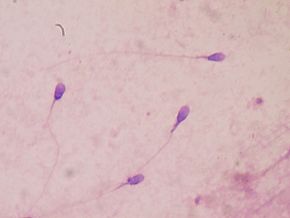 The research finding that eating fruits and vegetables with high pesticide residues has a negative effect on sperm is disturbing. It wasn't the amount of fruits and vegetables eaten, it was eating fruits and vegetables with high levels of pesticide residues. Yes, the study does have some limitations (for example, a one time analysis, looked at men at a fertility clinic and not the general population), but...even with these limitations, the results are disturbing.
The research finding that eating fruits and vegetables with high pesticide residues has a negative effect on sperm is disturbing. It wasn't the amount of fruits and vegetables eaten, it was eating fruits and vegetables with high levels of pesticide residues. Yes, the study does have some limitations (for example, a one time analysis, looked at men at a fertility clinic and not the general population), but...even with these limitations, the results are disturbing.
Earlier studies of children showed that switching to an organic diet has almost immediate results of reducing pesticide residues in the body (OP Pesticides in Children’s Bodies: The Effects of a Conventional versus Organic Diet). So the advice here is try to increase the amounts of organic fruits and vegetables in the diet, especially those with high pesticide residue levels.
Fruit or vegetables that were low in pesticide residues included peas, beans, grapefruit and onions. Those that had highest pesticide residues included peppers, spinach, strawberries, celery,blueberries, potatoes, peaches, plums, apples and pears.
From Time: A Diet High in Pesticides Is Linked to a Lower Sperm Count
The troubling link between pesticide exposure and fertility isn’t new; scientists have already established that people who work with pesticides tend to have lower fertility than people who don’t. But for the majority of us who don’t work with chemicals, diet is the biggest source of exposure, says Jorge Chavarro, MD, assistant professor of nutrition and epidemiology at Harvard School of Public Health and senior author of a new study published in the journal Human Reproduction.
Chavarro and his colleagues wanted to see if pesticide residues left on fruits and vegetables might have a similar effect on sperm—and their findings suggest that they did. Men who ate fruits and vegetables with a lot of pesticides had lower sperm counts and more oddly shaped sperm than those who had lower levels of dietary pesticide exposure.
Over an 18-month period, the researchers used data from the Environment and Reproductive Health (EARTH) study, including semen samples from 155 men who were being treated at a Boston fertility clinic and a food frequency questionnaire they completed. The researchers determined pesticide exposure by comparing the questionnaire answers with government data about produce pesticide levels in the USDA’s Pesticide Data Program.
The study didn’t tease out individual foods, but the researchers classified produce according to whether it had high or low-to-moderate levels of pesticides. Men who ate the most high-pesticide fruits and vegetables had a 49% lower total sperm count and 32% fewer sperm that were shaped normally, compared to men who ate the least amount of the high-pesticide produce.
Researchers gave each piece of produce a score based on its level of detectable pesticides, its level of pesticides that exceeded the tolerance level established by the U.S. Environmental Protection Agency, and whether the produce had three or more types of detectable pesticides. (The bigger the score, the more it hit all three measures.) Ranked from highest pesticide contamination to lowest, here were the top fruits and vegetables: Green, yellow and red peppers (6), Spinach (6), Strawberries (6), Celery (6), Blueberries (5), Potatoes (5), Peaches and plums (5), Apples or pears (5), Winter squash (4), Kale, mustard greens and chard greens (4), Grapes and raisins (4).
The team didn’t tease out associations with individual pesticides. But they believe that a mixture of pesticides—not just one particular pesticide—is responsible for the link. The strongest variable in their analysis were the proportion of fruits and vegetables consumed that use three or more pesticides. “The more pesticides are applied on any particular crop, that seems to be having a bigger impact,” Chavarro says...But for people who are concerned about their dietary exposure to pesticides, there are ways to lower it, he says, like eating organic and choosing produce not listed on the Environmental Working Group’s dirty dozen list.
From Science Daily: Pesticides in fruit and vegetables linked to semen quality
Assistant Professor of Nutrition and Epidemiology at the Harvard T.H. Chan School of Public Health in Boston (USA), Jorge Chavarro, said: "These findings should not discourage the consumption of fruit and vegetables in general. In fact, we found that total intake of fruit and vegetables was completely unrelated to semen quality. This suggests that implementing strategies specifically targeted at avoiding pesticide residues, such as consuming organically-grown produce or avoiding produce known to have large amounts of residues, may be the way to go."
There were no differences seen between men in the four groups who consumed fruit and vegetables with low-to-moderate pesticide residues. In fact, there was a significant trend towards having a higher percentage of normally shaped sperm among men who consumed the most fruit and vegetables with low pesticide residues -- a relative increase of 37% from 5.7% to 7.8%...Note:Pesticide use varies from country to country, but in the USA those used on fruit and vegetables include Atrazine, Malathion, Chlorpyrifos and Carbendazim.
